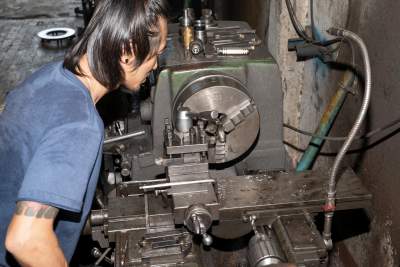Injuries at workplaces with industrial machinery containing moving parts can be avoided. For instance, workplace standards should require electricity to be shut off before performing equipment maintenance.
Another important safeguard is to have appropriate training, and policy against wearing long jewelry or tattered clothes, and requiring employees to wear their hair up, short, or tucked inside a hat. Moreover, the employer should always keep equipment in good repair to avoid injuries and potential liability. More often than not, workplace injuries involving industrial equipment could have been avoided if the proper safety measures had been implemented. If these injuries happen on the job, it is important to see if the workplace is liable for such injury.
 Occupational Safety and Health Act (OSHA)
Occupational Safety and Health Act (OSHA)
Employees have the right to a safe workplace. The Occupational Safety and Health Act of 1970 (OSHA) was passed to prevent workers from being harmed at work. The law requires employers to provide their employees with working conditions that are free of known dangers.
OSHA created the Occupational Safety and Health Administration, which sets and enforces protective workplace safety and health standards. Although you can report an unsafe machine or condition at work to OSHA, there is no private cause of action under OSHA. Thus, although OSHA may fine your Employer or require them to make changes, you will not be compensated under OSHA for your injuries.
What If An Injury Occurs While Using Unsafe or Defective Machinery?
In Pennsylvania, federal standards indicate that certain safety measures are implemented to prevent serious injury and death. Most workers who are injured would receive workers’ compensation benefits, assuming their employer has workers’ compensation insurance.
However, workers’ compensation only provides wage loss benefits at about 2/3 of your wages and medical benefits. It does not provide for pain and suffering and other damages. If your employer carries workers’ compensation, you are generally not allowed to sue your employer for your injuries, but must only collect or file a claim for workers’ compensation benefits.
However, relying on workers’ compensation requires the injured worker to give up their right to sue the company for their injury. While workers’ compensation may give benefits to cover some bills and losses, it may not be enough to recover from a catastrophic injury or an injury that would prevent someone from being gainfully employed. Workers’ compensation may not adequately compensate a worker who was unfairly hurt due to the wrongdoing or negligence of an employer.
If a person has received workers’ compensation by forfeiting their right to sue for negligence, then there is not much that an attorney can do to help that person recover from their employer. However, there are other legal remedies. An injury attorney would be able to determine whether there are other parties that may be responsible for the injury. Perhaps the place where the machine was located is not your employer or you are an independent contractor not entitled to workers’ compensation. Perhaps the company that designed the machine is responsible for the injury.
They may have used bad parts or perhaps their design of the machine is what caused the injury. This is also important because keeping the manufacturer responsible for the well-being of these workers will increase the amount of care given to the design of the machine and may make working conditions safer for other people in the future. Sometimes there is a maintenance company who improperly maintained the machine, who is at fault. With so much diversity in machine equipment, not all precautions can be taken, so when injury does occur, it is important to contact an attorney as quickly as possible.







 Occupational Safety and Health Act (OSHA)
Occupational Safety and Health Act (OSHA)